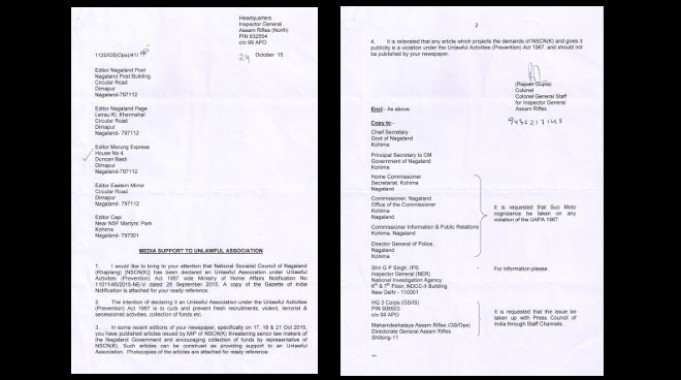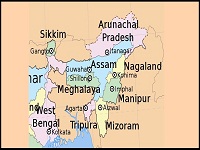Unlawful to report militant statements
The National Socialist Council of Nagaland (Khaplang) issues a warning that it would soon undertake “selective obliteration of elements daring to effect demise” of the struggle of the Naga people at the behest of the Nagaland government. Put simply, the organisation is threatening to eliminate senior lawmakers (a term it uses elsewhere in the same statement). Which self respecting newspaper would not report it?
All of them did but received an ominous letter a week later. It said that publicising such statements can be “construed as providing support to an unlawful association.”
On the 24th of October this year a colonel in the Assam Rifles sent a letter to five editors in Nagaland. With the subject line “Media Support to Unlawful Association”, it was addressed to the editors of Nagaland Post, Nagaland Page, Morung Express, Eastern Mirror and Capi.
It pointed out that the National Socialist Council of Nagaland (Khaplang) (NSCN-K) had been declared an unlawful association by the Home Ministry under the Unlawful Activities (Prevention) Act of 1967, as of September 28 this year. But, it said, in recent editions of these newspapers in October, articles had been published based on statements issued by the organization. It ended by reiterating that any article which projected and publicized the demands of the NSCN K was a violation of the Unlawful Activities Act and should not be published. Photocopies of recent articles in these papers were attached.
Copied in this communication were six officials of the state government, the chief secretary downwards, with four of them including the Director General of Police in Kohima being requested to take suo moto cognizance of any violation.
The government has imposed a five year ban on the NSCN (K).
With an army unit stationed in the state saying that the media is not free to report the news according to its judgement, and will be breaking the law if it does so, the editors in Nagaland find themselves in an unprecedented situation. They are conferring with each other and seeking counsel to formulate what their response should be. Since the ceasefire of 1997 they have not been faced with such a threat, though practicing journalism in this state (as in Manipur) is always a tightrope walk, negotiating state and non state actors.
The colonel signing the letter appended photocopies of stories in these papers which have been found objectionable.
These were on tax collection by certain persons from markets and business establishments who the NSCN (K) said were not authorized to collect taxes (published in three newspapers on October 21), on the “subversive course” being followed by senior lawmakers, on appointments made by the NSCN (K) to oversee commercial transactions in the state, and also the news items mentioned earlier on the warnings issued by this group about obliterating persons.
The media in this state is used to terse communications from the Assam Rifles. On September 7 it wrote to the Morung Express taking issue with extracts from The Naga Blog published by the paper which talked about Indian intelligence agencies. The letter said, “We do not expect your news to be Assam Rifles laudatory, but the least we expect from a respected newspaper like yours is to report in a free and fair manner with articles having verifiable content and credible authors. We request you to refrain from publishing any material which would unnecessarily incite the public and disrupt the existing peace in the State.” It was from the PRO of the Assam Rifles.
Meanwhile the last few months have seen increased exchange of fire between the AR and the NSCN (K) with some militants being killed. As the confrontation hots up, the press is caught in the middle.









